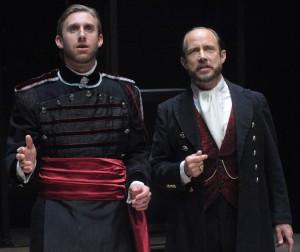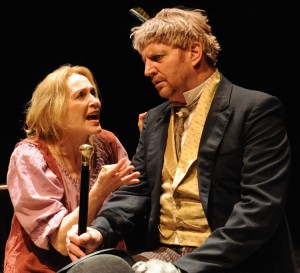Potomac Theatre Project (PTP) has opened its annual residency at Atlantic Stage 2, which is to say its annual advocacy for the plays of Howard Barker, one of Britain’s most challenging playwrights. “A good play puts the audience through a certain ordeal,” Barker told a Guardian interviewer in 2012. “I’m not interested in entertainment.” Yet if he has ever written anything close to a crowd-pleaser, then Scenes from an Execution is it, and the PTP production at Atlantic’s Stage 2 is well worth a visit.
Regrettably, Scenes is also notable because of the recent announcement of its star, Jan Maxwell, that she is retiring from the stage. Maxwell is reprising the role of Galactia, a Renaissance painter modeled on Artemisia Gentileschi (1593–1653), that she first played for PTP in 2008. Her fierce performance is typical of everything she does, and if she keeps her promise, it’s theater’s great loss.
The action takes place in the late 1500s in Venice, and the preliminary scenes introduce Galactia, a supremely talented painter in the city-state, with an ego to match, and her younger lover, Carpeta, played by David Barlow with a nice combination of passion and wariness.
Barker gives his characters names to suggest their qualities. For example, Urgentino is the Doge who has awarded Galactia a major commission and chafes to see it finished. At times, though, they are insufferably cutesy: one critic is named Lasagna and one of Galactia’s daughters is Dementia. One is left to assume that Carpeta is a character who is walked on by everyone, and that fits Barlow’s hapless lover. Carpeta has talent but recognizes it’s not on the order of Galactia's; a running joke is that he is in a rut of painting Christ among the flocks.
Galactia flourishes partly because she is a talented iconoclast, yet she resists being a leader for other women painters. Maxwell endows her character with intelligence and single-mindedness, but also a strange mix of guile and naiveté. When the arts-loving Doge (Alex Draper) commissions Galactia to depict the Battle of Lepanto (1571), a historical clash in which Venice defeated the Turkish navy and literally changed the course of history, she is determined to show the horror of war, assuming that the truth will not antagonize the establishment.
Under Richard Romagnoli's direction, aspects other than feminism receive their due. In keeping with his working-class concerns, the playwright examines the preparation for the painting—mixing colors, sketching and finding models. Galactia interviews a veteran who survives with an arrow stuck in his head, and she uses him in the painting. She is unflinching in her commitment to observe, so she also insists on seeing the open hole that he brags is in his belly. An encounter with an angelic, drunken sailor (Nicholas Hemerling) provides Galactia another visage for the canvas.
The Doge’s half-brother and the victor in the battle, the Admiral Suffici, poses for her as well, impeccable in his naval uniform. Yet Barker shows that even the most amenable patron has expectations: the Doge objects to his brother’s initial position in the painting: “He is the admiral and he is not big enough.” Says the dumbfounded Galactia: “He is fourteen feet high.” In his first scene, Bill Army invests the Admiral with a smirk and a sanguine sense of honor; a big payoff comes later, when Suffici is apoplectic with horror at Galactia’s portrayal of him. His indifference to carnage leaps off the canvas.
Although Barker also looks at critics and family, the primary struggle is between Galactia and the Doge, played by Draper with a suave reluctance to wield his full power. Ultimately the Doge wins, as governments do, by co-opting his opposition. He hangs the painting: “To have said this work could not be absorbed by the spirit of the Republic would be to belittle the Republic, and our barbarian neighbours would have jeered at us. So we absorb all, and in absorbing it we show our greater majesty. It offends today, but we look harder and we know it will not offend tomorrow.” PTP's production persuades one that Barker’s play is a powerful masterwork.
Scenes from an Execution is playing in repertory at Atlantic Stage 2 (330 West 16th St. between 8th and 9th Aves. in Manhattan) through Aug. 9, with two one-acts, Howard Barker’s Judith and Caryl Churchill’s Vinegar Tom. For dates, times and tickets, call 866-811-4111 or visit OvationTix.com.



